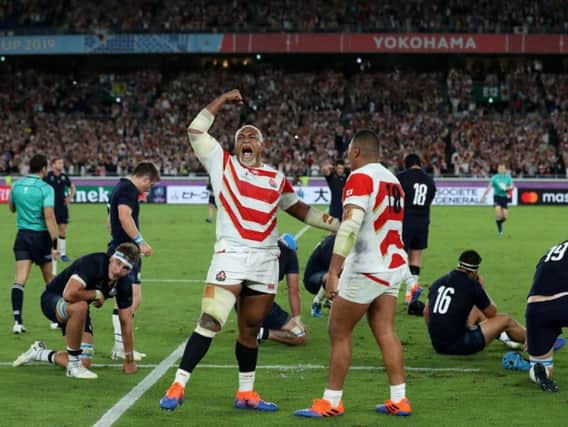Allan Massie: We should be praising Japan instead of bemoaning Scotland's fate


They were very good against Ireland. They were some way better today. From the tenth to almost the fiftieth minute they were sublime, their pace, handling and support play all remarkable. In that period they had 80 per cent of possession.
At half-time Ian McGeechan said they had been error-free. I don’t think a single pass went astray or was knocked on even by a thundering tackle - and there were a good many such tackles.
Advertisement
Hide AdAdvertisement
Hide AdIt was as close to perfection as you could get. Scotland secured a few turnovers but were always on the back foot, frantically shoring up the defence. At half-time I made a note saying Scotland were playing conventional European rugby, Japan a different game. Time and again they forced us to kick when we would rather have run the ball
Disappointment at half-time was all the sharper because we had begun so well, a beautifully judged kick from Finn Russell almost bringing a score for Darcy Graham, and then three or four phases later Finn outwitting the defence to cruise over for a try.
But the rest of the half was all about Japan’s brilliance and Scottish defence in which Jamie Ritchie, Johnny Gray and Magnus Bradbury were all outstanding. Yet the speed and assurance with which Japan moved play from one side of the field and back again meant that we tended to get too narrow when the ball was moved wide and so the Japanese found space to score tries.
When they scored a fourth almost immediately after the restart when the ball was ripped from Chris Harris in the tackle and the brilliant Fukuoka galloped free to score, I would guess that most of us feared a real drubbing. Certainly, I did.
That we came back with two well-made tries says much for the character of the team, and with the score 21-28 and a quarter of the game remaining, there was the prospect of a miraculous victory, even though it didn’t seem probable that we would be able to do enough to deny Japan qualification for the quarter-final ahead of us.
But then Japan with skill and resolution closed that narrowly opened window, and though we should perhaps have secured a draw after a neat kick forced the brilliant Matsushima to carry over his own try-line and concede a five-metre scrum , we couldn’t quite take the chance. This was disappointing, but if had scored and snatched the draw, that result would hardly have been a fair reflection of the match.
A measure of the quality of Japan’s play after our third try scored by Zander Fagerson is that their defence was so stifling that young George Horne didn’t have a single opportunity to show his attacking flair in his half-hour on the pitch.
So we are the ones sent homeward to think again and we have no reasonable grounds for complaint. In which context I would add that the New Zealand referee Ben O’Keefe seemed to me to handle the match very well and fairly.
Advertisement
Hide AdAdvertisement
Hide AdThere are days when you just have to say the better team won, and this was one of them. In consolation it was a magnificent match, even if Bryan Habana may have exaggerated a little when he called it one of the best matches in World Cup history.
It’s disappointing to be out before the quarter-final, but the real disappointment of this tournament was our inexplicably feeble performance against Ireland, not this match, all the more so because Japan didn’t have to play as well to beat Ireland as they did to beat us. This should be taken into account when the time comes for mature assessment – an assessment which may well take into account next weekend’s Japan-South Africa match.
Some of this squad will surely have come to the end of their international career, others possibly, but some encouragement can be taken from the development of younger players, George Horne and Darcy Graham in the back division, Jamie Ritchie, Magnus Bradbury, Scott Cummings and Zander Fagerson up front. Johnny Gray, still only twenty-five, had a storming game, his best for some time after a season when he had niggling injuries and was too often off the pace.
We lost, which is sad of course, but this match will be remembered when some victories are long forgotten, even if this is no consolation for the players as they settle in the homeward-bound plane.
Today, instead of moaning about our fate, we should be praising Japan. They played the best rugby I’ve seen this year. For the forty-something minutes between Finn Russell’s try and W P Nel’s, they were as faultless as they were brilliant. Every coach, especially ever school and youth coach, in Scotland should have his players watching the video of these forty minutes to learn just what is possible.
Now they go on to see if they can beat South Africa for the second World Cup in succession. If they do so, we can all feel better about today’s defeat.
On this form they would have beaten any other northern hemisphere side except perhaps England. That’s how good I think they were.